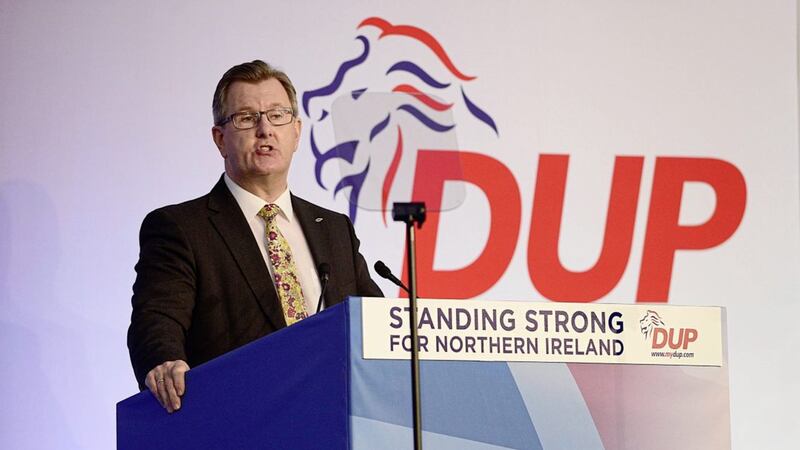HISTORY has a sense of humour. The idea that Jeffrey Donaldson is the answer to the DUP's leadership problem will grimly amuse the UUP and everyone else who remembers the years from 1998 to 2003, when he tore the latter party apart over entering government with Sinn Féin, primarily due to IRA decommissioning.
Donaldson finally quit to join the DUP, along with Arlene Foster, and entered government with Sinn Féin four years later.
IRA decommissioning never really happened, of course. We have all just agreed to pretend it did.
Donaldson was known in the UUP for his personal ambition, not that this is necessarily a flaw in a politician.
During the five-year crisis he caused in his former party he plainly revelled in being the centre of attention.
A book - his authorised biography - was even published about it: Not By Might: A Journey in Faith and Politics.
Then the journey came to a halt.
While Foster's star rose, Donaldson's apparently peaked.
He was re-elected MP for Lagan Valley in 2005, a position he has held since, but spent only a year in the Stormont executive, as a junior minister from 2008 to 2009, before choosing Westminster with the end of double-jobbing.
In the heyday of devolution, that counted almost as withdrawing from Northern Ireland politics.
But perhaps Donaldson was just biding his time, having noticed Foster's preferment under then DUP leader Peter Robinson, and having realised Robinson would not put up with one inch of the manoeuvrings he had made inside the UUP.
If it is the quiet ones you have to watch, those who have fallen quiet must be watched most of all.
Rumours of Donaldson as Foster's replacement only began late last year.
The media had not seriously considered him up to that point due to a formulaic understanding of DUP factionalism, in which it was assumed the party would not replace one 2003 UUP defector with another.
Such are the challenges facing the DUP this formula is redundant. There is a shortage of credible, willing leadership candidates and a strong sense that anyone who can do the job should have it.
What gifts would Donaldson bring to the role?
He has spent much of his quiet period on the international peace circuit, demonstrating an ability to build personal relationships with counterparts in Sinn Féin, at least when there is something in it for him, which in fairness is the definition of practical politics.
These trips have required an enthusiasm for the Good Friday Agreement that must have David Trimble chewing his Nobel Prize.
On the specific issues deadlocking Stormont, Donaldson set out a stall at last weekend's Fine Gael conference in Wexford.
Reporting of his speech was dominated by comments on the Republic joining the Commonwealth - an issue of little interest to unionists and huge controversy among republicans, so barely worth discussing in terms of practical politics.
The rest of his remarks were more significant. Donaldson expressed a strong desire to restore devolution on a more stable footing, praised the North-South Ministerial Council and said same-sex marriage and abortion could pass through the assembly because the DUP can no longer raise a petition of concern on its own.
In truth, under present assembly numbers, the DUP could still be certain of enough support from other unionists to block anything contentious.
In public, Donaldson remains opposed to the critical issue of an Irish Language Act, while the actual content of his Wexford remarks was little more than has been said by Foster several times, including to nationalist audiences in the south.
So the hopes increasingly placed on Donaldson, by himself and others, largely boil down to the different style he might bring to much the same substance - and in style, he is hardly Gandhi.
When debate turns fractious Donaldson can still resort to whataboutery and head off down tribal tangents.
No doubt that tone still needs to be struck to reassure large parts of the DUP.
The real hope is that once in charge he can resume his journey towards a more conciliatory destination.
The DUP might use Brexit or the RHI inquiry as an opportunity to ease Foster off the stage, possibly later this year.
But if it replaces her with Donaldson, with his identical party pedigree, it will be painfully obvious his main qualification is being able to open his mouth without immediately causing the rest of Northern Ireland to put its head in its hands.
If you didn't laugh you would cry, as the UUP has done already.
newton@irishnews.com









